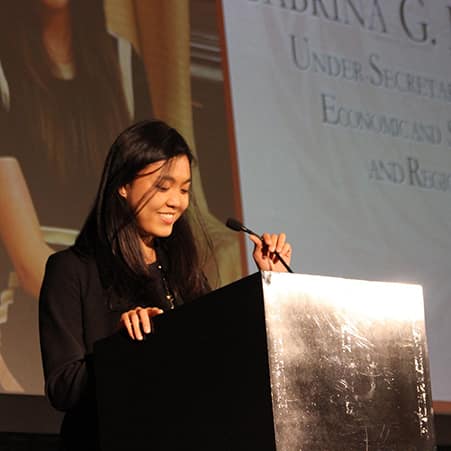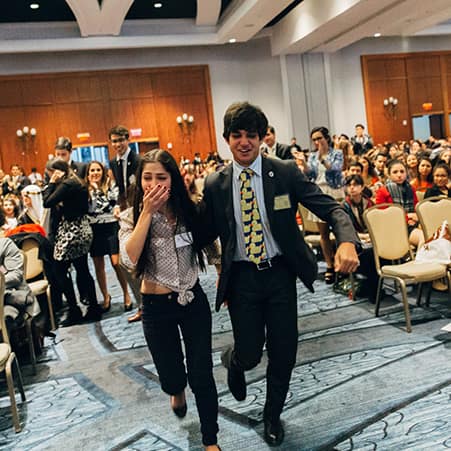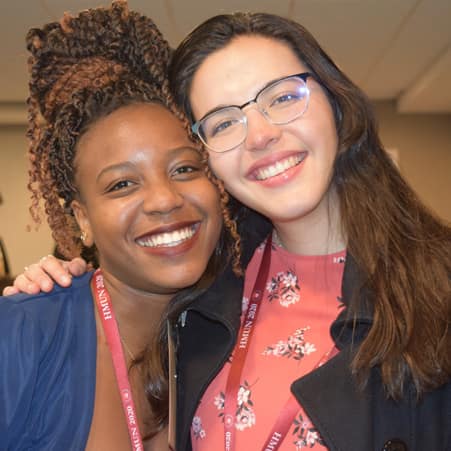HMUN
Harvard Model
United Nations
Dal 27 Gennaio al 2 Febbraio 2026
Tra le più antiche e prestigiose simulazioni al mondo, l’HarvardMUN è interamente organizzata dall’Harvard University per gli studenti delle scuole superiori. Uno dei momenti più importanti del progetto è costituito dal College Fair, nel corso del quale saranno illustrate le modalità di selezione e ingresso all’Università di Harvard e ad altre prestigiose università americane.

La preparazione
Per affrontare al meglio la simulazione, gli studenti, nei mesi precedenti la partenza, partecipano al Delegate Training Course. Tutte le nostre lezioni sono interattive e si svolgono in lingua inglese. I nostri docenti hanno un livello di inglese madrelingua, ma grazie agli anni di esperienza nel mondo delle simulazioni, sono pronti ad aiutare gli studenti ad entrare in contatto in modo graduale con l’inglese utilizzato nel mondo della diplomazia internazionale. Il Delegate Training Course si articola in quattro lezioni e si svolge in modalità e-learning.

Partenza dall'Italia e arrivo a Boston. Trasferimento e sistemazione in Hotel.

Sei pronto delegate? Inizia HMUN! Dopo l'Opening Ceremony di Harvard MUN è prevista la prima Committee Sessions.

La migliore accademia al mondo, un vero e proprio paradiso per i lettori. Il terzo giorno visiterai il Campus di Harvard. A seguire la seconda Committee Sessions.

Il Day 4 è interamente dedicato al dibattito. Committee Session n.3: penultimo giorno prima della chiusura dei lavori.

Dopo l'ultima Committee Session, nel pomeriggio sono in programma delle visite guidate per la città di Boston! Città e capitale dello stato del Massachusetts, una delle città più antiche esistenti negli U.S.A.

Il sesto giorno è interamente dedicato ad altre splendide visite guidate in giro per Boston, la culla d’America, la più inglese delle città americane, con i suoi palazzi di mattoni rossi e i vicoli stretti mescolati ai grattacieli.

Terminato il model e le nostre avventure alla scoperta di Boston, è ora di tornare a casa: partenza con volo di linea per l’Italia.

È stata un'esperienza fantastica! Ma purtroppo dovrai aspettare il prossimo anno per ripeterla. HMUN termina qui, con il rientro in Italia.
HMUN - FAQ
Le risposte che cerchi
La partecipazione ad Harvard Model United Nations è riservata agli studenti che hanno già preso parte al nostro progetto che si svolge a New York o San Francisco.
Puoi iscriverti online cliccando sul seguente link.
Se sei uno studente che ha già preso parte a uno dei progetti internazionali sviluppati da United Network scrivi una e-mail a info@unitednetwork.it. Nel bando di partecipazione troverai i costi del progetto.
Il progetto Harvard Model United Nations si svolge in lingua inglese.
HMUN- FAQ
La partecipazione ad Harvard Model United Nations è riservata agli studenti che hanno già preso parte al nostro progetto che si svolge a New York o San Francisco.
Puoi iscriverti online cliccando sul seguente link.
Se sei uno studente che ha già preso parte a uno dei progetti internazionali sviluppati da United Network scrivi una e-mail a info@unitednetwork.it. Nel bando di partecipazione troverai i costi del progetto.
Il progetto Harvard Model United Nations si svolge in lingua inglese.